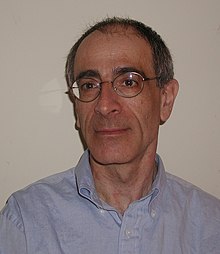Marius Clore
| G. Marius Clore | |
|---|---|
 |
|
| Born |
June 6, 1955 London, U.K. |
| Residence | United States |
| Citizenship | United States and U.K. |
| Nationality | British |
| Fields | Nuclear magnetic resonance, biophysics, structural biology |
| Institutions | National Institute of Diabetes and Digestive and Kidney Diseases, National Institutes of Health |
| Alma mater | University College London and University College Hospital Medical School |
| Doctoral advisor | Sir Arnold Burgen FRS |
| Known for | Laying the foundations for three-dimensional protein structure determination in solution by NMR, developing innovative approaches for extending NMR to larger and more complex systems, and using NMR to uncover invisible states of proteins |
| Notable awards | •Member of the United States National Academy of Sciences •Fellow of the American Academy of Arts and Sciences •Foreign Member of the Academia Europaea •Royal Society of Chemistry Centenary Prize (2011) •Biochemical Society Centenary Award (2013] |
|
Website spin |
|
G. Marius Clore FRSC (born June 6, 1955) is a British/American molecular biophysicist and structural biologist. He was born in London, U.K. and is a dual US/U.K. Citizen. He is a member of the United States National Academy of Sciences, a NIH Distinguished Investigator, and the Chief of the Protein NMR Spectroscopy Section in the Laboratory of Chemical Physics of the National Institute of Diabetes and Digestive and Kidney Diseases at the National Institutes of Health. He is known for his foundational work in three-dimensional protein and nucleic acid structure determination by biomolecular NMR spectroscopy, for advancing experimental approaches to the study of large macromolecules and their complexes by NMR, and for developing NMR-based methods to study rare conformational states in protein-nucleic acid and protein-protein recognition.
Clore received his undergraduate degree with first class honours in biochemistry from University College London in 1976 and medical degree from University College Hospital Medical School in 1979. After completing house physician and house surgeon appointments at University College Hospital and St. Charles Hospital (part of the St. Mary's Hospital group), respectively, he was a member of the scientific staff of the Medical Research Council National Institute for Medical Research from 1980 to 1984. He received his PhD from the National Institute for Medical Research in Physical Biochemistry in 1982. He was awarded a Lister Institute Research Fellowship from the Lister Institute for Preventive Medicine which he held from 1982 to 1984 at the Medical Research Council. In 1984 he joined the Max Planck Institute for Biochemistry in Martinsried, Germany, where he headed the Biological NMR group from 1984 to 1988.
...
Wikipedia
